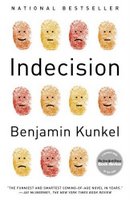Guest Book Review: Indecision
 Diligent readers will remember that I purchased a copy of of Benjamin Kunkel's "lad lit" sensation Indecision a few months ago and promised a review. [note: if you search "michael kimmel lad lit" on Google, my original post is the fourth link. Wow!] I read the first twenty pages and found that I hated it. My friend Kat, however, read the whole thing. When she told me that, I said 'well why don't you review it then?' She did, and she sent me this mysterious photo of herself to go with the review. Here's her review:
Diligent readers will remember that I purchased a copy of of Benjamin Kunkel's "lad lit" sensation Indecision a few months ago and promised a review. [note: if you search "michael kimmel lad lit" on Google, my original post is the fourth link. Wow!] I read the first twenty pages and found that I hated it. My friend Kat, however, read the whole thing. When she told me that, I said 'well why don't you review it then?' She did, and she sent me this mysterious photo of herself to go with the review. Here's her review: When Sir Harry Masticator approached me to write a review of Benjamin Kunkel’s Indecision, I was kind of, well, ambivalent. Because I couldn’t decide whether I thought it was a) the most important book in the universe or b) a book of no importance whatsoever. And as much as I tried to resolve this dialectic into a reasonable Hegelian synthesis, I could not because I tend to give up easily, in line with my new Timothy Leary-style "turn on, tune in, and drop out" approach to life. So what follows are some of my hallucinogenic impressions on this book, rather than a close textual analysis and/or feminist cultural critique.
When Sir Harry Masticator approached me to write a review of Benjamin Kunkel’s Indecision, I was kind of, well, ambivalent. Because I couldn’t decide whether I thought it was a) the most important book in the universe or b) a book of no importance whatsoever. And as much as I tried to resolve this dialectic into a reasonable Hegelian synthesis, I could not because I tend to give up easily, in line with my new Timothy Leary-style "turn on, tune in, and drop out" approach to life. So what follows are some of my hallucinogenic impressions on this book, rather than a close textual analysis and/or feminist cultural critique. I think I am in love Kunkel. When I first heard about the "next literary wunderkind" stuff in the Times or wherever, and my friend said that he was supposed to be "fucking hot," [editor's note: it wasn't me] I thought I had better check into this ruckus. And I thought that Kunkel would surely be enchanted by me (Kluegel) solely on account of our eerily similar surnames and the undeniable camaraderie of sharing life experiences that follow from such queer branding. Although we may not like to admit it, it is true that we tend to like people who express the good taste of liking us first. Sure, his enchantment with me was expressed in the realm of the hypothetical, but then again so is the premise of this novel/memoir written by the fictional Dwight Wilmerding who is probably based on significant aspects of Herr Kunkel’s own stream-of-consciousness/inner demons. Anyway, I had high hopes for us as a couple, and I had become certain that we would have very attractive children. Then I read the first chapter of Indecision available for free on newyorktimes.com. And my dreams began to crumble.
In the first chapter, Kunkel -- I mean Dwight Wilmerding -- introduces his Chambers St. crew and his dead-end job at Pfizer’s Problem Resolution Center and his inability to commit and his covert passion for philosopher Otto Knittel (Martin Heidegger). But he begins the chapter laid out on his New York City bed with not-so-clean sheets, offhandedly comparing his sort-of girlfriend (the exotic Vaneetha) to a dog and sort-of deciding that he would be better off with a dog. I was like: What the fuck? Who does this guy think he is, Henry Miller? So it was easy to post a knee-jerk-to-the-balls posting on The Masticator in agreement with Kimmel’s mocking critique of “lad lit”: self-indulgent, nihilistic, annoyingly self-reflexive, existential angst-ridden ramblings of aging young privileged white dude hipsters. After that first chapter, I really started to resent Kunkel and was ready to call off the costume party/commitment ceremony that I had arranged at that Polish dive bar with the free jukebox in Williamsburg.
During my years in the slammer -- I mean grad school -- I (kind of) learned how to approach a text stoically, to become saturated in it, to take voluminous notes, to observe with analytic precision, to brew, and to fester and to coagulate into a final analysis only when the time was right. So I decided to cut a brother a break and actually read the entire book. I thought: Who knows -- perhaps that crafty Chuck Klosterman used his sweaty mitts to hack into newyorktimes.com and alter Kunkel’s chapter for the sake of sabotage? Still the feelings of resentment had been planted and I started to wonder if there were other women. Truckloads of exotic beauties revealed to be Kunkel’s -- I mean Dwight’s -- fancy. And, as we all know, the constant suspicion is really the worst. So I refused to buy the book and instead rented it from my friendly library.
Thankfully the rest of the book was not filled with exotic girlfriend/dog comparisons. In fact, I found his pacing to be "pleasant and relaxing" (Kunkel p. 80) and his portraiture of hipster archetypes to be downright uncanny in a funny way. As far as the plot is concerned, Dwight is a dude desperately trying to get in touch with his own Dasein, or Heideggerian being-in-the-world. His inability to commit in the realm of "romantico-sexual" relationships (HI-larious props for using this term, Kunkel p. 23), his craptastic job, his solace in material bodily pleasures such as eating or excretion -- these are all things that are easy to find humorous empathy with. (At least if one feels, like myself, to be fundamentally misaligned in the Dasein department.) There is a sweetness and self-deprecation in his portrayal of the inherently-meaningless existential condition of life that would make the pill, if poorly executed, hard to swallow. But Kunkel invites you in with an open, castor oiled, arm hair-matted embrace that allows it to comfortably slide down the gullet. And this marksmanship works to contextualize the initially scary, sociopathic game of "compare and contrast" with Vaneetha and the hypothetical dog. Plus this is a novel, for god's sakes, and Dwight is (ostensibly) fictional, so don’t blame the messenger already!
I also really appreciated the characterization of his sister, Alice, the sex-positive queer feminist Marxist anthropologist. I guess because as someone who identifies in the same way, on certain occasions, I should have found her caricature totally offensive. But instead I found it to be well-observed comic genius. And props to Kunkel for being privy to the winds of contemporary anthropological thought -- like Alice’s most recent ethnography entitled Consumer Survivalism -- on contemporary U.S. garage-accumulation culture. This is something I could have totally seen myself doing.
Suddenly, at some point in the story, a paper airplane from the sky offers Dwight’s Dasein the (welcome) opportunity of being torqued into a decisive, authentic state of being thanks to a new pharmaceutical wonder called Abulinix, meant to cure chronic indecision. This drug, in conjunction with an impromptu trip to Quito, Ecuador to visit an (attractive Dutch) high-school pal named Natasha that he may or may not have a secret longing for, offers Dwight hope for the possibility of leading a fully-engaged, committed life. Which is all that anybody can really ask for anyway, right?
So he goes to Ecuador and madcap antics ensue. He gets dissed by Natasha and ends up stuck with her friend, an attractive Belgian-Argentinian (read: exotic) girl named Brigid. They spend sexually-charged time together in the jungle, where Brigid -- a lapsed anthropologist -- recently conducted her fieldwork. This, again, leads me to believe that Kunkel has definitely, at some point, dated a grad student in anthropology. Brigid’s key informant is Edwin, a colonized tribal guy that performs "absolute indigenism" to make a (postmodern) living. Wait a minute -- did I date Kunkel?
The Abulinix seems to be working and Dwight thinks he’s making meaningful decisions, like scheming to import the super effective, all-natural depilatory discovered by Edwin in bobohuariza tree sap. I must say that I really enjoyed that Kunkel/Dwight made a point of repeatedly mentioning his full-body pelt of hair. I think it was necessary for K/D to have some kind of physical flaw because if he were just a super-attractive dude with warped Dasein it wouldn’t be as good, and readers might assume he’s a total ass-hole rather than kind-of an asshole. And the kind-of, as you may have noticed, is a key component to Dwight’s not-being-well-in-the-world.
But I don’t want to go on (and on) and spoil the myriad existential highjinks and not-so-surprise ending in store for you if you haven’t yet read the book. Instead I will tell you this: shit is complicated. And by that I mean my simultaneous love and resentment towards Kunkel will probably never be resolved. I [heart] his existential novel format (total turn-ON) and comfortably loony style and satirical rendering of the atrocities of globalization and class-privilege and postmodernism and the plight of the omnipresent hipster. I guess I resent him because he’s famous now and hot and possibly sexually fetishizes foreign girls.
From a less solipsistic perspective, Kimmel is a goddamn academic superstar on the topic of historical representations of masculinity in the U.S. and Europe. Thus his humorous typification of the emergent genre of "lad lit" is backed by some serious empirical muscle. If we are thinking about this genre, the interesting questions are: Why it this happening now? And what is its social significance? But I think these are questions best left to academic professionals. For me, within the context of Indecision, there is also an obviously self-parodying tone throughout that is seeking to resist, and comment on, this very typification. (Although one could argue that this hyper-self-reflexivity is also a characteristic of the genre.) So, at the beginning of this mess, when I offered the a) and b) interpretations, it was partly an homage to Kunkel and partly a comment on the all or nothing way in which individual texts are judged in a way that is always imbricated in the prevailing literary Zeitgeist.
As someone who was once an academic (looking for empirical truths) turned memoir writer (looking for subjective truths), this issue has been increasingly important to confront. Thus as much as I’m "turned off" by our old pal Henry Miller (R.I.P), I can now more fully respect Kate Millet’s response to his work in Sexual Politics: "Miller is a compendium of American sexual neuroses, and his value lies not in freeing us from such afflictions, but in having had the honesty to express and dramatize them."
That said, if Dwight asked me to marry him I might very well have the same response as Brigid.
The author of this review, Kathryn Kluegel, is working on a memoir/novel-disguised-as-memoir entitled All But Dead about her experience as a Ph.D. student in cultural anthropology.


2 Comments:
i love hot fur!
i love hot fur!
Post a Comment
<< Home